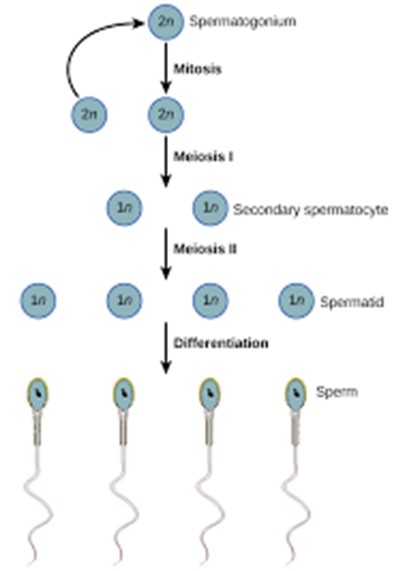Which of the following kidney functions contributes to the production of red blood cells?
Releasing stored bicarbonate
Producing and secreting erythropoietin
Stimulating conversion of angiotensinogen
Activating vitamin D
The Correct Answer is B
a. Releasing stored bicarbonate: This function helps regulate acid-base balance but is not related to red blood cell production.
b. Producing and secreting erythropoietin: The kidneys produce and release erythropoietin, a hormone that stimulates red blood cell production in the bone marrow.
c. Stimulating conversion of angiotensinogen: This is part of the renin-angiotensin system, which regulates blood pressure and fluid balance, not red blood cell production.
d. Activating vitamin D: This function helps in calcium and phosphate metabolism but is not directly involved in red blood cell production.
Nursing Test Bank
Naxlex Comprehensive Predictor Exams
Related Questions
Correct Answer is C
Explanation
a. Spermatozoa: These are the mature male gametes (sperm cells) that result from spermatogenesis but do not describe the process of meiosis itself.
b. Spermiogenesis: This is the final stage of spermatogenesis, where spermatids undergo morphological changes to become mature spermatozoa.
c. Spermatogenesis: This is the process that includes both meiosis and subsequent maturation steps, resulting in the formation of spermatozoa. It involves the production of haploid sperm cells from diploid germ cells.

d. Spermatocytes: These are the cells that undergo meiosis during spermatogenesis. Primary spermatocytes undergo the first meiotic division to form secondary spermatocytes, which then undergo the second meiotic division to produce spermatids.
Correct Answer is C
Explanation
a. Glycoproteins: Glycoproteins are proteins that have carbohydrate groups attached to them and are not related to glycogen breakdown.
b. Glycosaminoglycan: Glycosaminoglycans are long polysaccharide molecules involved in building connective tissues, not in glycogen catabolism.
c. Glycogenolysis: Correct. Glycogenolysis is the process of breaking down glycogen into glucose to be used for energy.
d. Gluconeogenesis: Gluconeogenesis is the process of producing glucose from non-carbohydrate sources, not the breakdown of glycogen.
Whether you are a student looking to ace your exams or a practicing nurse seeking to enhance your expertise , our nursing education contents will empower you with the confidence and competence to make a difference in the lives of patients and become a respected leader in the healthcare field.
Visit Naxlex, invest in your future and unlock endless possibilities with our unparalleled nursing education contents today
Report Wrong Answer on the Current Question
Do you disagree with the answer? If yes, what is your expected answer? Explain.
Kindly be descriptive with the issue you are facing.
